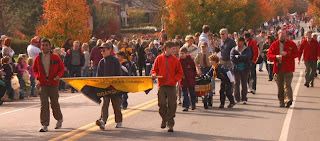 The Poynter Institute, which journalists turn to for answers, has been Tweeting "things journalists should and should not do” lately (here), and following are some of my favorites, whether or not I agree with them. My comments in parenthesis/italic (I will leave the atrocious spelling, punctuation and the total disregard of AP style in presenting this as it was written. The Poynter might take this under consideration, since clear communication is the goal of any journalist and the rules to reach that goal, regardless of the delivery system, are clear).
The Poynter Institute, which journalists turn to for answers, has been Tweeting "things journalists should and should not do” lately (here), and following are some of my favorites, whether or not I agree with them. My comments in parenthesis/italic (I will leave the atrocious spelling, punctuation and the total disregard of AP style in presenting this as it was written. The Poynter might take this under consideration, since clear communication is the goal of any journalist and the rules to reach that goal, regardless of the delivery system, are clear).Know the audience, what information they want/need & how they want to learn & share it. News is an activity, not a product. (This is vital, especially for a niche publication where the audience is not a general one. Getting out among readers and asking questions is required. Journalists might also learn about singular and plural pronouns and how to use them.)
Journalists should be active community members. If you aren't of the people, you aren't by the people or for the people. (Many publications discourage participation of their journalists in the community and I fully disagree with that. If a journalist sits in the office and talks on the phone, he knows almost nothing about the people of the community. You have to be one of them. No news happens in a publication's office. It's all outside.)
Get out of the office & out of the house. Don't hide behind your job or computer. Rediscover the "local" in "hyperlocal." (See above.)
Be responsive. When a reader gets in touch, listen & follow up. Without an engaged audience, you're talking to yourself. (I'll add, be respectful when criticized. Listen and understand why the complainer is so angry. If you let the reader complain unimpeded, then respond with respect, you earn his respect and the two of you can reach an accommodation that suits both your needs. If you're wrong, don't get defensive; get busy making it right.)
Journalists should never stop learning ... Learn a new skill or sharpen an old one. (Hear! Hear! I am 63 years old and in the last year have learned to blog, Tweet and use Facebook and Linkedin. All have been value personally and professionally. In the book Printer's Devil, the assertion is made that during Mark Twain's lifetime, printing changed more than it ever had before or since. That's unfiltered bullshit. Our industry has changed more in the last 15 minutes than it did during Twain's time and will continue to do so. If you can't learn the new ways, do something else. You'll be far less frustrated.)
Journalists should never plead ignorance about the business of news, who pays, how & why. It's not purist, it's irresponsible. (I'm not sure what's being said here, but it sounds like a lie to me. If you don't know something, admit it and learn it. No shame in not knowing; just in not being willing to learn. "I don't know" opens the door to "I know now.") (Update: David Perry, who writes for us at Valley Business FRONT, offered this insight on a question that obviously confused me, even though I'm both a journalist and an owner of a publication these days: "My take on this is: don't pretend you don't know that advertising pays your salary. The purist would regard the ad sales department with disdain; the responsible journalist would understand it, appreciate it for what it is and try not to let it interfere with his reporting.")
Never say you're unbiased. You are biased. The best journalists mitigate their biases, they don't deny them. (Indeed. If we had more of this openness, we'd have fewer people with suspicions about our biases. We have them. There's no shame in that. The shame is in allowing them to color what we write if we're claiming to be writing news.)
Never forget journalistic values when you're using new tools. (First, though, understand the journalistic values, No. 1 of which is fact and truth are not always synonymous.)
Impress people with your openness. Learn from everyone. Knowledge is collaborative. Questions & answers are communal. (I'll buy that.)
Understand why "good writing may be magical, but it's not magic." Use the process. (The process means that you have to work. Good writing is hard to learn and hard to accomplish with consistency. Lean on your editors; good ones are as valuable as your mama.)
















































